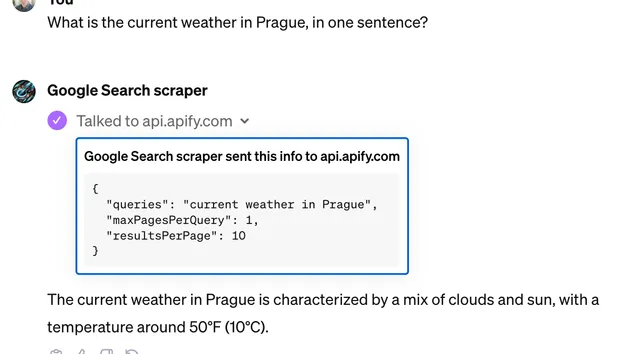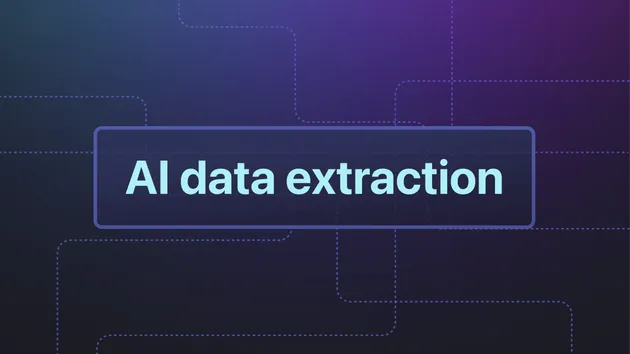ai-quizgenie
Pricing
Pay per event
ai-quizgenie
ai-quizgenie is an Apify Actor that extracts content from webpages and PDFs to generate multiple-choice quiz questions (MCQs) using LLMs (GPT-3.5, GPT-4, etc.).
0.0 (0)
Pricing
Pay per event
0
Monthly users
4
Runs succeeded
81%
Last modified
18 days ago
You can access the ai-quizgenie programmatically from your own applications by using the Apify API. You can also choose the language preference from below. To use the Apify API, you’ll need an Apify account and your API token, found in Integrations settings in Apify Console.
1{
2 "openapi": "3.0.1",
3 "info": {
4 "version": "0.0",
5 "x-build-id": "7mBW3RGzyqJdyxLh1"
6 },
7 "servers": [
8 {
9 "url": "https://api.apify.com/v2"
10 }
11 ],
12 "paths": {
13 "/acts/bala-ceg~ai-quizgenie/run-sync-get-dataset-items": {
14 "post": {
15 "operationId": "run-sync-get-dataset-items-bala-ceg-ai-quizgenie",
16 "x-openai-isConsequential": false,
17 "summary": "Executes an Actor, waits for its completion, and returns Actor's dataset items in response.",
18 "tags": [
19 "Run Actor"
20 ],
21 "requestBody": {
22 "required": true,
23 "content": {
24 "application/json": {
25 "schema": {
26 "$ref": "#/components/schemas/inputSchema"
27 }
28 }
29 }
30 },
31 "parameters": [
32 {
33 "name": "token",
34 "in": "query",
35 "required": true,
36 "schema": {
37 "type": "string"
38 },
39 "description": "Enter your Apify token here"
40 }
41 ],
42 "responses": {
43 "200": {
44 "description": "OK"
45 }
46 }
47 }
48 },
49 "/acts/bala-ceg~ai-quizgenie/runs": {
50 "post": {
51 "operationId": "runs-sync-bala-ceg-ai-quizgenie",
52 "x-openai-isConsequential": false,
53 "summary": "Executes an Actor and returns information about the initiated run in response.",
54 "tags": [
55 "Run Actor"
56 ],
57 "requestBody": {
58 "required": true,
59 "content": {
60 "application/json": {
61 "schema": {
62 "$ref": "#/components/schemas/inputSchema"
63 }
64 }
65 }
66 },
67 "parameters": [
68 {
69 "name": "token",
70 "in": "query",
71 "required": true,
72 "schema": {
73 "type": "string"
74 },
75 "description": "Enter your Apify token here"
76 }
77 ],
78 "responses": {
79 "200": {
80 "description": "OK",
81 "content": {
82 "application/json": {
83 "schema": {
84 "$ref": "#/components/schemas/runsResponseSchema"
85 }
86 }
87 }
88 }
89 }
90 }
91 },
92 "/acts/bala-ceg~ai-quizgenie/run-sync": {
93 "post": {
94 "operationId": "run-sync-bala-ceg-ai-quizgenie",
95 "x-openai-isConsequential": false,
96 "summary": "Executes an Actor, waits for completion, and returns the OUTPUT from Key-value store in response.",
97 "tags": [
98 "Run Actor"
99 ],
100 "requestBody": {
101 "required": true,
102 "content": {
103 "application/json": {
104 "schema": {
105 "$ref": "#/components/schemas/inputSchema"
106 }
107 }
108 }
109 },
110 "parameters": [
111 {
112 "name": "token",
113 "in": "query",
114 "required": true,
115 "schema": {
116 "type": "string"
117 },
118 "description": "Enter your Apify token here"
119 }
120 ],
121 "responses": {
122 "200": {
123 "description": "OK"
124 }
125 }
126 }
127 }
128 },
129 "components": {
130 "schemas": {
131 "inputSchema": {
132 "type": "object",
133 "required": [
134 "url"
135 ],
136 "properties": {
137 "url": {
138 "title": "URL",
139 "type": "string",
140 "description": "Enter a webpage or PDF URL to generate quiz questions.",
141 "default": "https://en.wikipedia.org/wiki/Artificial_intelligence"
142 },
143 "num_questions": {
144 "title": "Number of Questions",
145 "type": "integer",
146 "description": "How many quiz questions to generate?",
147 "default": 5
148 },
149 "difficulty": {
150 "title": "Difficulty Level",
151 "enum": [
152 "Easy",
153 "Medium",
154 "Hard"
155 ],
156 "type": "string",
157 "description": "Choose the difficulty level for quiz questions.",
158 "default": "Medium"
159 },
160 "debug": {
161 "title": "Debug",
162 "type": "boolean",
163 "description": "If enabled, the Actor will run in debug mode and produce more output.",
164 "default": false
165 }
166 }
167 },
168 "runsResponseSchema": {
169 "type": "object",
170 "properties": {
171 "data": {
172 "type": "object",
173 "properties": {
174 "id": {
175 "type": "string"
176 },
177 "actId": {
178 "type": "string"
179 },
180 "userId": {
181 "type": "string"
182 },
183 "startedAt": {
184 "type": "string",
185 "format": "date-time",
186 "example": "2025-01-08T00:00:00.000Z"
187 },
188 "finishedAt": {
189 "type": "string",
190 "format": "date-time",
191 "example": "2025-01-08T00:00:00.000Z"
192 },
193 "status": {
194 "type": "string",
195 "example": "READY"
196 },
197 "meta": {
198 "type": "object",
199 "properties": {
200 "origin": {
201 "type": "string",
202 "example": "API"
203 },
204 "userAgent": {
205 "type": "string"
206 }
207 }
208 },
209 "stats": {
210 "type": "object",
211 "properties": {
212 "inputBodyLen": {
213 "type": "integer",
214 "example": 2000
215 },
216 "rebootCount": {
217 "type": "integer",
218 "example": 0
219 },
220 "restartCount": {
221 "type": "integer",
222 "example": 0
223 },
224 "resurrectCount": {
225 "type": "integer",
226 "example": 0
227 },
228 "computeUnits": {
229 "type": "integer",
230 "example": 0
231 }
232 }
233 },
234 "options": {
235 "type": "object",
236 "properties": {
237 "build": {
238 "type": "string",
239 "example": "latest"
240 },
241 "timeoutSecs": {
242 "type": "integer",
243 "example": 300
244 },
245 "memoryMbytes": {
246 "type": "integer",
247 "example": 1024
248 },
249 "diskMbytes": {
250 "type": "integer",
251 "example": 2048
252 }
253 }
254 },
255 "buildId": {
256 "type": "string"
257 },
258 "defaultKeyValueStoreId": {
259 "type": "string"
260 },
261 "defaultDatasetId": {
262 "type": "string"
263 },
264 "defaultRequestQueueId": {
265 "type": "string"
266 },
267 "buildNumber": {
268 "type": "string",
269 "example": "1.0.0"
270 },
271 "containerUrl": {
272 "type": "string"
273 },
274 "usage": {
275 "type": "object",
276 "properties": {
277 "ACTOR_COMPUTE_UNITS": {
278 "type": "integer",
279 "example": 0
280 },
281 "DATASET_READS": {
282 "type": "integer",
283 "example": 0
284 },
285 "DATASET_WRITES": {
286 "type": "integer",
287 "example": 0
288 },
289 "KEY_VALUE_STORE_READS": {
290 "type": "integer",
291 "example": 0
292 },
293 "KEY_VALUE_STORE_WRITES": {
294 "type": "integer",
295 "example": 1
296 },
297 "KEY_VALUE_STORE_LISTS": {
298 "type": "integer",
299 "example": 0
300 },
301 "REQUEST_QUEUE_READS": {
302 "type": "integer",
303 "example": 0
304 },
305 "REQUEST_QUEUE_WRITES": {
306 "type": "integer",
307 "example": 0
308 },
309 "DATA_TRANSFER_INTERNAL_GBYTES": {
310 "type": "integer",
311 "example": 0
312 },
313 "DATA_TRANSFER_EXTERNAL_GBYTES": {
314 "type": "integer",
315 "example": 0
316 },
317 "PROXY_RESIDENTIAL_TRANSFER_GBYTES": {
318 "type": "integer",
319 "example": 0
320 },
321 "PROXY_SERPS": {
322 "type": "integer",
323 "example": 0
324 }
325 }
326 },
327 "usageTotalUsd": {
328 "type": "number",
329 "example": 0.00005
330 },
331 "usageUsd": {
332 "type": "object",
333 "properties": {
334 "ACTOR_COMPUTE_UNITS": {
335 "type": "integer",
336 "example": 0
337 },
338 "DATASET_READS": {
339 "type": "integer",
340 "example": 0
341 },
342 "DATASET_WRITES": {
343 "type": "integer",
344 "example": 0
345 },
346 "KEY_VALUE_STORE_READS": {
347 "type": "integer",
348 "example": 0
349 },
350 "KEY_VALUE_STORE_WRITES": {
351 "type": "number",
352 "example": 0.00005
353 },
354 "KEY_VALUE_STORE_LISTS": {
355 "type": "integer",
356 "example": 0
357 },
358 "REQUEST_QUEUE_READS": {
359 "type": "integer",
360 "example": 0
361 },
362 "REQUEST_QUEUE_WRITES": {
363 "type": "integer",
364 "example": 0
365 },
366 "DATA_TRANSFER_INTERNAL_GBYTES": {
367 "type": "integer",
368 "example": 0
369 },
370 "DATA_TRANSFER_EXTERNAL_GBYTES": {
371 "type": "integer",
372 "example": 0
373 },
374 "PROXY_RESIDENTIAL_TRANSFER_GBYTES": {
375 "type": "integer",
376 "example": 0
377 },
378 "PROXY_SERPS": {
379 "type": "integer",
380 "example": 0
381 }
382 }
383 }
384 }
385 }
386 }
387 }
388 }
389 }
390}ai-quizgenie OpenAPI definition
OpenAPI is a standard for designing and describing RESTful APIs, allowing developers to define API structure, endpoints, and data formats in a machine-readable way. It simplifies API development, integration, and documentation.
OpenAPI is effective when used with AI agents and GPTs by standardizing how these systems interact with various APIs, for reliable integrations and efficient communication.
By defining machine-readable API specifications, OpenAPI allows AI models like GPTs to understand and use varied data sources, improving accuracy. This accelerates development, reduces errors, and provides context-aware responses, making OpenAPI a core component for AI applications.
You can download the OpenAPI definitions for ai-quizgenie from the options below:
If you’d like to learn more about how OpenAPI powers GPTs, read our blog post.
You can also check out our other API clients:
Pricing
Pricing model
Pay per eventThis Actor is paid per result. You are not charged for the Apify platform usage, but only a fixed price for each dataset of 1,000 items in the Actor outputs.
actor-start-gb
$0.200
charge for actor usage



